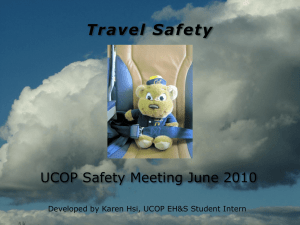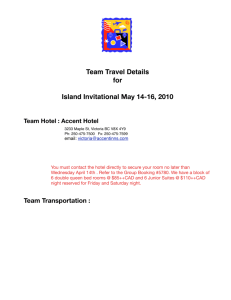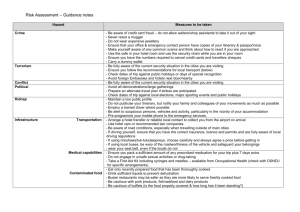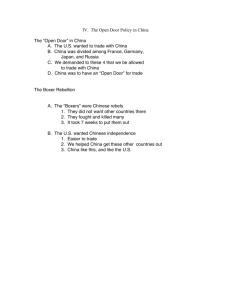Travel Safety - Environmental Health & Safety Resources for ANR
advertisement
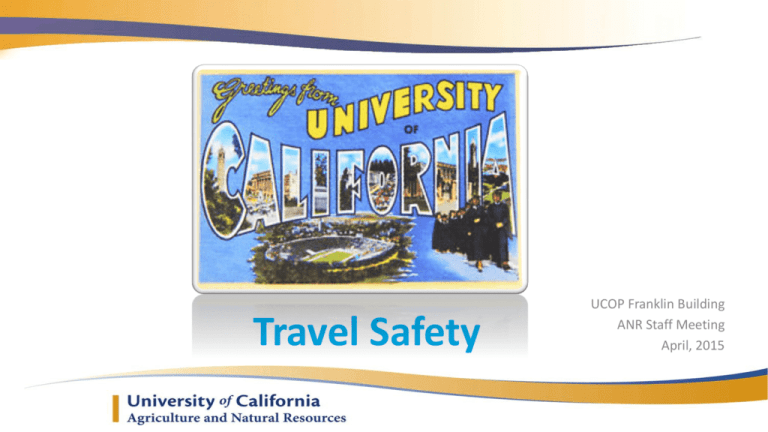
Travel Safety UCOP Franklin Building ANR Staff Meeting April, 2015 Travel Hazards • Transportation related Accidents: – airline, motor vehicle, personal • Crime: – assault, robbery, theft • Fire: – hotel, destination, forest • Ergonomic injuries: – lifting, sitting, playing Pre-Travel Preparations • Photocopies of: – tickets, credit cards, health insurance, passport, & other important documents • Replacement Information: – phone numbers (often on back side of card) – websites, account numbers • Share your Itinerary: – with family/office, especially when traveling alone • Plan your Travel Route: – map out directions from airport to hotel and/or destinations – Keep an actual copy in your carry-on luggage, do not solely rely on electronics Pre-Travel Preparations • Emergency Phone Numbers: – Physician, Family – Local Police Dept. 911 Equivalent Number • Essentials in Carry-On Luggage – Keep crucial items on/with you – Lithium Batteries are Not Permitted in Checked Luggage - Fire Hazard • Hotel Have Automatic Fire Sprinklers? http://apps.usfa.fema.gov/hotel/ • Overseas Travel – Go to: – U.S. State Department travel website http://travel.state.gov/travel/tips/safety/safety_1180.html Out-of-State/Out-of-Country Travel • UC employees traveling on business are provided insurance coverage • Register all UC out-of-state or out-of-country business travel • Book trips through Connexxus – You are automatically registered • Manually register through: www.uctravel.org • Visit UC ANR Business Travel website: http://safety.ucanr.edu/Programs/Business_Travel/ • Includes links to: - Travel FAQ Insurance registration - UC Trip Planner (global travel resource) - Connexxus Travel Program - Domestic Travel - International Going Through Airport Security • All liquid bottles should be 3.4 ounces (100 ml) or less and put into a 1quart Ziploc® bag • Remember to take all water & other beverages out of carry-on baggage • Remove laptop from case & place in a separate screening bin • Take shoes off • Follow instructions from the TSA personnel Ergonomics • Luggage – Wheels – Weight Less Than 45-50 Pounds – Caution Lifting Luggage from Car Trunk • Laptops – Case with Wide Padded Shoulder Straps – Alternate Between Shoulders Regularly – Put Accessories in Suitcase Pre-Flight Preparations • From Seat - Count Number of Rows to Nearest Emergency Exit • Number of Rows to the Exit in Front • Number of Rows to the Exit Behind • Listen to Safety Briefing By Flight Attendant • Event of Accident/Crash – Listen and Follow to Flight Attendant Instructions Thrombosis • Defined as a clot of coagulated blood in the blood vessel • During long trips deep vein thrombosis can develop from lack of movement • Can be fatal – Pulmonary Embolism • World Health Organization (WHO) estimates that 1 out of 4,500 travelers will develop a clot • During flights of more than 4 hours try and move around, get blood circulation flowing Some advice on how to prevent Thrombosis! 1. Wear compressions stockings 2. Flex and Point your toes 3. Bounce your legs 4. Ask your physician before taking blood thinners Travel Reminders Video • http://animoto.com/play/6HdxrB9kU7ZiyVpUWquunA Transportation Rental Car Safety • Rental Car with No “Company Logo” • Keep Luggage in Trunk • Do Not Want to Draw Attention -You are a Visitor • Be Wary of Pulling Over, Especially in the Dark or in Unfamiliar Territory • Do Not Exit Car Until It is Safe ANR Rental Car Info: • Stay on Main Roads http://safety.ucanr.edu/Programs/Business_Travel/Rental_Car_Info/ • Keep Rental Car Doors Locked Transportation Rental Car Safety • http://www.youtube.com/watch?v=MavNSc2_Zy4 • Inspect Your Car and Become Familiar with Vehicle Safety Features Before Driving the Car Out of the Lot • Headlights, Hazard Lights, Door Locks & Spare Tire Hotel Safety • Worried about Bed Bugs? Ask our local experts. Visit UC IPM websites: http://www.ipm.ucdavis.edu/PMG/PESTNOTES/pn7454.html • Hotel selection: – Rooms with Electronic Locks, Deadbolts, Peepholes – Garage Elevators Go to Lobby, Not Guest Floors • Entering Elevators with Suspicious Looking Strangers – be cautious, wait • High Rise Hotels Rooms on the 6th Floor or Lower - Fire Ladders Can Reach Hotel Safety • Valuables in Hotel/Room Safe • Use Peep Hole Before Opening Door – When in Doubt, Call the Front Desk • Deadbolt Door Each Time You Enter Room • “Make-Up Room” Sign – Advertises No One is in the Room • Inquire with Hotel Staff on “Safe” and “Unsafe” Local Areas Hotel Safety • First Entry to Room – Hold Door Open & Turn On Light – Visually Scan the Room • Emergency Exits – Look at Floor Layout on Back of Room Door – Count the Number of Doors to Nearest Emergency Exit & Secondary Emergency Exit – Visit the Exit to familiarize yourself • Prepare to Leave Room in Emergencies – Essential Items on Night Stand / Flashlight Hotel Fires • More than 4000 Motel/Hotel Fires Per Year – Averages More Than 10 Fires per Day – Pre-Planning Important • In the Event of a Fire – Take Essentials, Cell Phone, Room Keys, & Flashlight (Leave Near Bed) – With Family – Designate Meeting Location – Feel Door (Use Backside of Hand) Hotel Fire – HOT DOOR! • Do Not Open Door! Stay Put • Call Fire Dept.–Tell Them Your Exact Location • Place Signal on Window–Sheets or Towels • Fill Tub with Water • Place Damp Towels/Sheets – Around Cracks – Wet Towel Over Your Nose & Mouth • Shut Off Fans/Air Conditioners • If Smoke in Room – Open Windows • Higher than Second Floor – Do Not Jump Hotel Fire - Door Not Hot • Slowly Open Door, Check if Hallway Clear • Crawl to Stairway Emergency Exit • Lock Room Door In Case You Need to Return to Room • Do Not Use Elevators • Cautiously Use Exit Stairwell • If Encounter Heavy Smoke, Turn Around - Try Second Emergency Exit • Meet At Designated Spot Hotel Fire Safety Video! • Steps to take if a fire did occur in your hotel… http://animoto.com/play/nDf9HGKHQWT3kNC502L7Cg General Travel Safety Precautions • • • • • • • Watch for “Staged Mishaps” – Ploy to Divert Your Attention Beware of Your Surroundings Keep Valuables Secured Safety in Numbers – Stay with Groups Ask for Help or An Escort if Uneasy with a Situation Use ATMs During the Day & When People Are Around Do Not Draw Attention to Yourself – Clothing/Jewelry – Looking at Maps – Avoid Looking Like a Tourist - Wrap Local Newspaper or Magazine Outside Map/Guidebook Food Safety On Trips • Food Allergies while travelling – Inquire About Ingredients in the Menu Items • Take caution to Food Borne Illnesses • Enjoy in moderation, of course Travel Safety References • UC Travel Webpage: – www.uctravel.org • UC ANR Business Travel Webpage: – http://safety.ucanr.edu/Programs/Business_Travel/ • UCOP Risk Services Travel Webpage: – http://www.ucop.edu/risk-services/loss-prevention-control/travel-assistance/ • FEMA List of Sprinklered Hotels: – www.usfa.fema.gov/hotel • U.S. State Dept. Travel Safety Webpage: – http://travel.state.gov/travel/tips/safety/safety_1180.html • Safe Trip Abroad Publication – Travelers Checklist – http://travel.state.gov/travel/tips/safety/safety_1747.html Travel Safety Quiz ANR Franklin Safety Meeting April, 2015 If you suspect a fire in the hallway outside your hotel room, you should: A. Open the door and look outside B. Feel the door to see if its warm C. Place a wet towel at the base of the door if you see smoke D. Both B and C If you suspect a fire in the hallway outside your hotel room, you should: A. Open the door and look outside B. Feel the door to see if its warm C. Place a wet towel at the base of the door if you see smoke D. Both B and C If renting a vehicle on a trip: A. Become familiar with the vehicle safety features before leaving the lot. B. While driving - send a text message to the person you will be meeting. C. Place your luggage in the back seat while the car is parked. D. “Channel surf” on the radio while driving to find your favorite music. If renting a vehicle on a trip: A. Become familiar with the vehicle safety features before leaving the lot. B. While driving - send a text message to the person you will be meeting. C. Place your luggage in the back seat while the car is parked. D. “Channel surf” on the radio while driving to find your favorite music. Prior to traveling on UC business: A. If an out-of-state trip – Register the trip on the UC travel webpage. B. Program emergency phone numbers in you cell phone directory. C. Leave your trip itinerary with family and your office. D. All of the above. Prior to traveling on UC business: A. If an out-of-state trip – Register the trip on the UC travel webpage. B. Program emergency phone numbers in you cell phone directory. C. Leave your trip itinerary with family and your office. D. All of the above.
